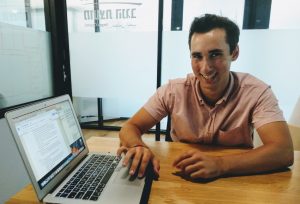
My name is Max Eagle and this is my story of my internship in the Negev council. I will be a Junior at Temple University in Fall 2018. I am currently pursuing a Bachelor of Arts in Communication Studies with a focus in Policy, Regulation and Advocacy, with a minor in History. For the summer of 2018, I participated in a program called Onward Israel Philadelphia, a program that helps young Jewish adults find internships in Israel. Through this program, I was offered a position as a Public Policy Intern for the Negev Council. The Negev Council is “a civic organization made up of heads of local municipalities, public representatives, and local business owners, whose aim is to represent the Negev region and bring their voices and needs to the government and various national policy makers”. When I accepted the position, I never imagined how impact-full the Council is not only for the Negev region, but for the future of the State of Israel.
Two weeks before the program started, I visited Israel through Birthright. It was absolutely incredible. I loved my trip because it not only helped me forge a stronger connection to my Jewish Identity, but it also deepened my appreciation for the State of Israel. I enjoyed every aspect of Birthright – from visiting the Kotel and Mt. Hertzel to roaming the shuks of Jerusalem and Carmel Market. It was one of the best experiences of my life and I find myself deeply fortunate to have had this opportunity. While on the trip, my group stayed in the Negev for two nights. We visited Big Be’er Sheva, where we hiked Masada, slept in the Bedouin tents, and swam in the Dead Sea. Each of these experiences were amazing, and I thought they would serve as a great preview to the rest of my summer. But Birthright only taught part of the story of the Negev. I remained completely unaware of the challenges that the the region and residents of the Negev face every single day. It was not until I began working for Mr. Yohan Atlan, the CEO of the Negev Council, that I realized that investing in the Negev is investing in the future of the State of Israel.
In terms of numbers and statistics, the current population of Israel is 8.57 million people. Roughly 6.6 million live in the “center” Tel Aviv/Jerusalem area, 1.45 million live in the North, and 730,000 live in the Negev. The Negev region encompasses 63% of the land of Israel, yet it is occupied by less than 10% of the population. This imbalance is detrimental for the country and without long-term planning, will only get worse. By 2048, just 30 years from now, the population of Israel is expected to more than double to 17 million, with an estimated 13 million living in the “center”, 2.4 million living the North and only 1.6 million in the Negev. The Tel Aviv/Jerusalem area of Israel is already extremely overcrowded and will not be able to sustain double the current population. At the same time, the quality of life will suffer in the Negev and the North if the government continues to neglect these “peripheral areas”.
This is where the Negev Council comes in. The Council works on a three-prong initiative to help improve the overall quality of life in the Negev:
1) monitoring decisions made by the Israeli government which are directly related to the Negev in order to hold the government accountable for these decisions;
2) Building partnerships with all of the various groups throughout the Negev in order to put their differences aside to create a universal agenda that focuses on improving the overall quality of life in the region; and
3) Creating new policies that support this universal agenda and lobby them to the government and members of the Knesset in order to ensure that they are brought to fruition.
As my summer internship comes to an end, I realize that the best way to summarize everything I learned and what motivated my work was the Council’s slogan: “Good for the Negev. Great for Israel”. These issues go beyond the residents and the region of the Negev. It astonishes me that this is not a common understanding among the global Jewish population and supporters of Israel. I received a solid Jewish education in the United States, yet it took a one-in-a lifetime opportunity in Israel for me to learn about these serious challenges that the country is currently facing. I know that I am leaving Israel as an American Ambassador for the Negev because to go back and not share what I’ve learned with others would make me part of the problem. The hard work and effort of the Council is not just to improve the overall quality of life for the residents of the Negev, but for the entire population of Israel. Unless this information is spread and people begin to understand the importance of investing in the Negev, then they will only understand the consequences of these issues when it is too late.
